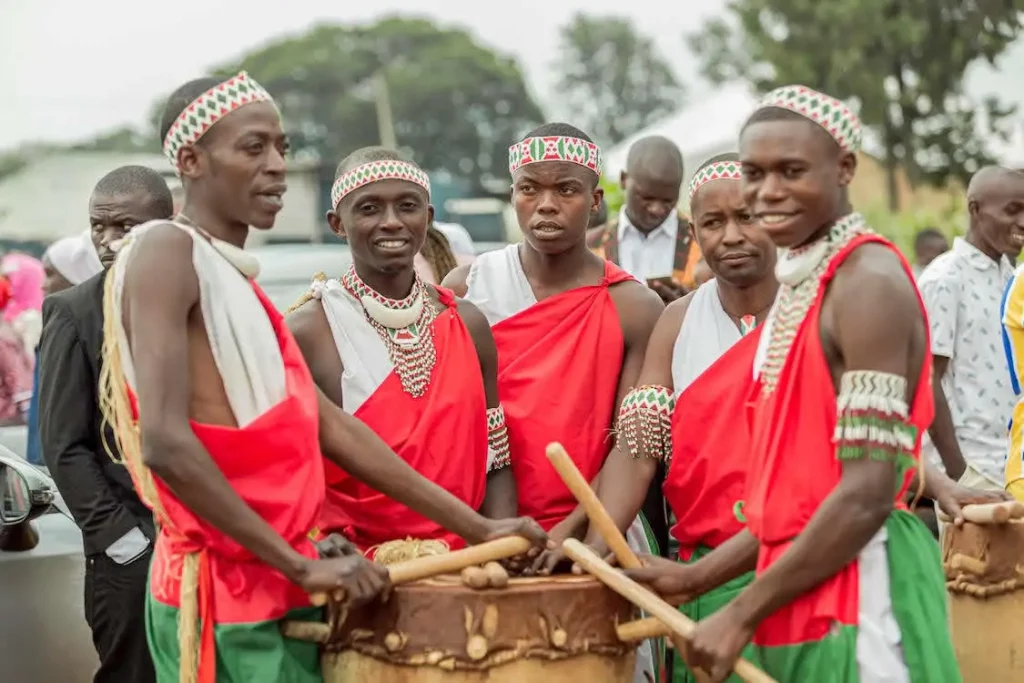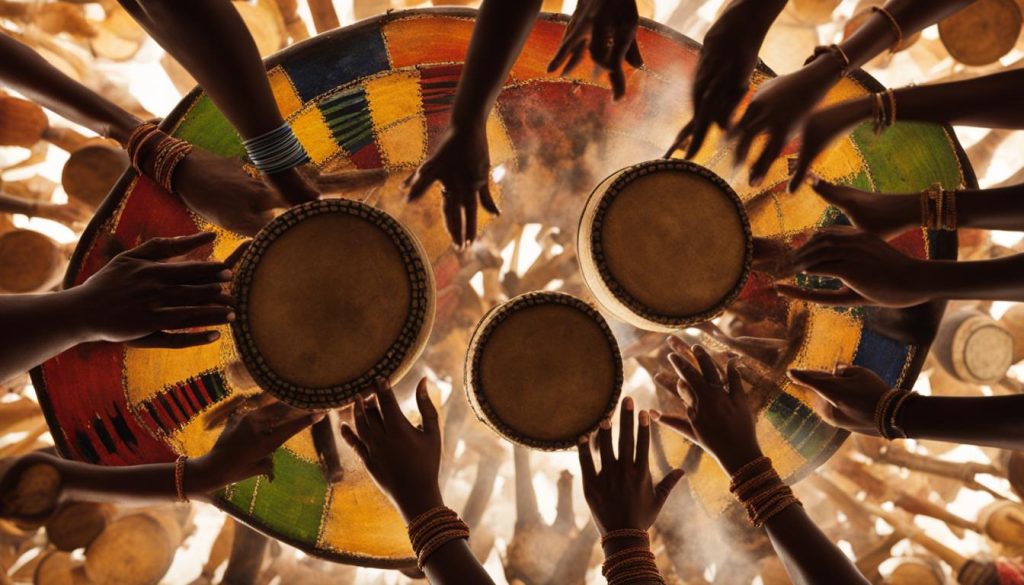African drums have a unique and profound symbolic meaning within African culture and tradition. But what does the African drum symbolize?
They symbolize the soul of the community and are used in ceremonial events and rituals.
Different African drums have specific meanings in their respective communities, such as the Karyenda drum in Burundi, the Djembe drum in Mali, the Entenga drums in Uganda, the Ngoma drum in Central and South Africa, and the Gbedu drum in Nigeria and Benin.

Content
The Symbolism of African Drums in Different Cultures
African drums hold deep cultural and symbolic significance within various African cultures.
Each type of drum carries its unique meaning, representing different aspects of community and tradition.
Karyenda Drum from Burundi
The Karyenda drum from Burundi holds great cultural significance as it is considered the main symbol of the country.
It represents the Mwami, the King of Burundi, and serves as a powerful emblem of leadership and unity.
Djembe Drum from Mali
The Djembe drum, also known as the “talking drum,” is widely recognized for its versatile use in rituals, social dances, ancestral worship, and rites of passage.
It plays a fundamental role in communicating messages and emotions within Malian culture.
Entenga Drums from Uganda
The Entenga drums, historically associated with the Buganda Kingdom in Uganda, were considered royal instruments.
These drums were played every morning at 3 am for the King, symbolizing power, authority, and the rhythm of life.
Ngoma Drum in Central and South Africa
In Central and South Africa, the Ngoma drum is fundamental in healing ceremonies and tribal rituals.
It serves as a unifying force, bringing individuals together and strengthening bonds within the community.
Gbedu Drum from Nigeria and Benin
The Gbedu drum, commonly used in ceremonial Yoruba music, holds a symbolic significance in Nigeria and Benin.
It represents royalty and is often played during important events and celebrations.
These diverse African drums demonstrate the rich cultural heritage and traditional symbolism associated with African drumming.
They convey powerful messages, connect communities, and serve as a reflection of the values and beliefs of their respective cultures.
The Cultural and Spiritual Significance of African Drums
African drums hold deep cultural and spiritual significance in African communities. They are more than just musical instruments; they are a reflection of the soul of African life.
African drums are integral to all aspects of African culture, from birth to death, marriage ceremonies to religious rituals.
Used to communicate, celebrate, mourn, and inspire, African drums are the rhythmic heartbeat that resonates throughout African communities.
They bring people together, connecting villages and tribes through their powerful beats.
African drumming is not limited to joyful occasions; it also plays a role in battle calls and war preparations, embodying the strength and unity of the community.
The drums echo the cultural values and traditions of each African society, creating a sense of pride and identity.
There are various types of African hand drums, each with its own distinct sound and purpose. Some notable examples include the djembe, sabar, bougarabou, talking drum, and udu.
These drums are crafted with care, skill, and attention to detail, representing the cultural heritage and craftsmanship of their respective regions.
Throughout history, African drums have been regarded as sacred instruments, believed to possess spiritual powers. They are used in religious ceremonies, healing rituals, and spiritual practices.
The sound of the drums is believed to connect humans to the divine, channeling positive energy and invoking spiritual awakening.
The Role of African Drums in Music and Dance
African drums hold great significance in the realms of music and dance, playing a vital role in the cultural fabric of African societies.
These drums are the driving force behind the fast-paced, rhythmic beats that define African music, creating an energetic and captivating atmosphere.
Not only are they musical instruments, but they are also works of art, boasting intricate designs and decorations that reflect the rich cultural traditions and values of African communities.
The sound of African drums has the power to stir deep emotions, inspiring passion, excitement, and even trances among those who listen.
The rhythmic heartbeat of these drums sets the pace for dancers, guiding their movements and adding an extra layer of vibrancy to African dance performances.
It is through these drums that dancers can fully express themselves and connect with their African heritage.
African drums come in various shapes and sizes, each with its own unique cultural and symbolic meaning.
They can be made from different materials such as wood, metal, earthenware, and gourds, further adding to their diverse and captivating nature.
Some drums are played individually, while others are part of larger drum ensembles, creating a symphony of beats that resonates deeply with both performers and audiences.
To truly appreciate the significance of African drums in music and dance, one must experience the power, energy, and sheer joy they bring firsthand.
Whether at a traditional African ceremony or a modern-day performance, the presence of these drums is undeniable, leaving a lasting impression on all who witness their enchanting rhythms.
African Drums in Modern Context
African drums continue to hold immense importance and significance in modern African society. They play a vital role in various traditional ceremonies, rituals, and spiritual healing practices.
These drums are not only cherished cultural treasures but are also employed as tourist attractions in many African countries, offering visitors a glimpse into the rich heritage and vibrant culture of the continent.
Furthermore, African drums have become an integral part of social enterprises that uplift and empower local communities.
By connecting tradition to the modern market, these enterprises help preserve and revitalize the old ways of drumming, ensuring that the art form remains alive and relevant in today’s world.

African drumming has extended its reach beyond the borders of Africa and gained popularity worldwide.
The rhythmic beats of African drums have the power to captivate and inspire people around the globe, spreading the joy of making music and encouraging passion and self-expression.
From cultural festivals to music schools, African drumming has found its place in the hearts and minds of music enthusiasts everywhere.
Whether it’s the traditional ceremonies in African villages, the captivating performances for tourists, or the global stage where African drumming takes center stage, the importance and significance of these drums continue to resonate, preserving the cultural heritage and serving as a powerful symbol of African identity.
Conclusion
The symbolism of African drums holds profound cultural, and spiritual meanings within African communities.
They serve as a powerful representation of the soul of the community, carrying messages, celebrating important events, and providing the rhythmic heartbeat to African music and dance.
These drums are not only instruments but also works of art, featuring intricate designs that reflect the traditions and values of their communities.
